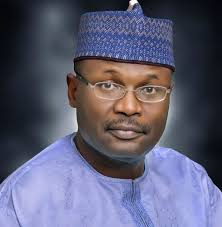The Independent National Electoral Commission, INEC, has stated its resolve to obey any amendment to the Electoral Act or time table as long as it was timely and legitimate.
Prof. Mahmood Yakubu, INEC Chairman, stated this at the Prof. Abubakar Momoh Memorial Lecture organized by The Electoral Institute TEI, the training and research arm of the commission in Abuja Sunday.
Represented by a National Commissioner, Prof. Okechukwu Ibeanu, the INEC boss was reacting to the reported amendment of the 2019 election time table by the House of Representatives.
“It is still a proposal by the House of Representatives. I think it is still going to enjoy concurrence of both chambers of the National Assembly for harmonization as well as input from states.
”As a law-abiding organization, INEC works with the Electoral Act. If there is a legitimate amendment to the Act, INEC will have no option than to obey, but that must happen first.
“As I said, the role of INEC is to conduct elections based on the law; if there is a legitimate amendment to the Electoral Act, INEC will obey.
”Practically, there is an ECOWAS protocol discouraging amendment of the Electoral Act before the election in less than six months to an election and we still have more than six months”, he said.
According to the time table released by INEC, the presidential and National Assembly elections are slated for February19, 2019 and governorship and Houses of Assembly, March 3, 2019.
On whether the commission would approach the courts on the issue, he said: “What are we approaching the court for? When we see the amendment and if it is necessary, we can approach the court then. Doing that now is like putting the cart before the horse.”
Worries over Proliferation of Parties
Meanwhile, INEC has expressed worry at the proliferation of political parties, saying apart from presenting logistic challenge Nigeria’s literacy level could affect voters’ choices.
At a retreat organized for political parties Monday in Abuja, INEC Chairman, Prof. Mahmood Yakubu, represented by his Chief Technical Adviser, Prof. Bolade Eyinla, said; “We are also concerned about the increasing number of political parties and access to the ballot. Since the last general elections in 2015, the commission has conducted 178 elections which is the largest outside the general elections. One of the challenges we have is for political parties to obey their own rules.
“There is the question of managing the political parties during an election, or monitor their primaries. You can imagine 68 party agents in a polling unit. There is also the issue of how to manage the ballot paper for 68 political parties. The biggest ballot paper I have seen is that of Afghanistan whose ballot paper is almost the size of a prayer mat, where people have to crawl to find their political parties.
Considering our level of literacy, I think that is going to be a major challenge. The question of exclusion is a major issue in the electoral process because any exclusion will affect the entire electoral process. So, managing the ballot paper is going to be a major challenge”, he added.
He also lamented that many of the political parties are defaulting in submitting their financial returns to INEC and in auditing their campaign finances.
As for the 2019 election, he said INEC would not appropriate votes. “Parties should go out there and carry out their primary responsibility of voter mobilization in order to garner votes.
“Another issue that worries the commission is the issue of inclusiveness, especially women participation in politics. Recently, the list of women participation in politics was released and Nigeria was among the bottom five, while Rwanda was among the top. The commission appeals to political parties to lay a lot of emphasis on inclusivity in political party affairs.
“The commission is also worried about the slow pace towards the enactment of the electoral legal framework. The Senate President promised us that the electoral legal framework will be ready by the end of 2016, but this is end of January 2018. Without a definitive electoral framework, it is a bit difficult to plan the election and according to the ECOWAS Protocol on Democracy and Good Governance, you cannot touch the electoral legal framework six months to election. In order words, we have to deal with this electoral legal framework with a terminal date of July because after July, it will be extremely difficult to touch it.
“Since the commission has released its schedule of activities, it is expected that the political process will be busy with campaigns going on here and there; we wish to admonish that campaigns should be devoid of hate speeches while canvassing for votes.”

